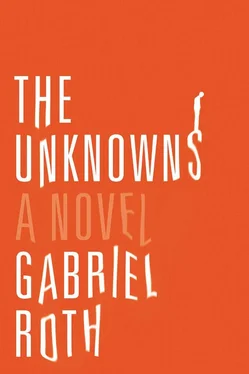“Do you remember her?”
“I have this strong sense of, like, mom . But when I think about what she looked like all I can see are photographs.”
The smell of roasting coffee beans blows over us, a smell that bears no relation to the flavor of coffee itself. I take a risk. “Where were you when you found out she died?”
“I was in my room,” she says. “I was playing with my Etch A Sketch, and my dad came in and told me she was dead. He wasn’t crying, and I said, Why aren’t you crying ? and he said, I’ve been crying, honey. I’ve been crying for half an hour . He’d waited to tell me — he wanted to compose himself first. I was so furious. I’d been drawing on my Etch A Sketch like an idiot while my mom was dead. I kept screaming, Why didn’t you tell me ?”
After this there’s a sense that we’ve navigated something tricky together. Soon we go downstairs, rubbing our cold hands, and fall kissing onto my bed. We pin each other by the wrists; we wrestle like kids; we grind like teenagers. And then I start to unbutton her shirt, and she resists with a quick shake of her head. We go back to kissing for a while, but we’ve lost focus, and soon we’re lying on our backs looking up at the rafters.
“All right if we wait a while on the sex thing?” she says. It’s not quite a question.
“Sure, yeah, no problem,” I say. “Take it slow.” She smiles, and we kiss some more. In a way it’s worse but in a way it’s better. I do want to have sex with her — for the obvious reasons, and to seal the deal. But more than that I want to avoid wrecking everything.
For the next few weeks we see each other almost every night, which makes me feel as though I’ve passed into another world with different laws. I start to discover how her ordinary life functions, although obviously you can never discount the impact of the observer on the phenomenon under observation. I quiz her on her history, which she presents as a series of phases passed through like railway stations. The binge-drinking phase started at fifteen and was over by the time she went to college. She characterizes it as a response to her difficult relationship with her father, about whom she says little. College saw the advent of the radical activism phase. Since moving to San Francisco she’s become open to the possibility of ambition, although in her case the desideratum is not money but prestige, which is currency among journalists. For the past year she’s been appearing on the local public radio station once a month. At the paper she pushes every deadline, and because she’s a star she gets away with it. This inspires resentment in her coworkers, particularly the editor who has to stay late to wait for her copy. She’s apologetic but not fearful, because as long as she brings in good stories, no one will fire her for making the editor work late. She comes to my house in the evenings, and we eat dinner and kiss and fall asleep together, and those two hours justify everything that has ever happened to me.
I was living in the same suburban bungalow where I’d grown up, working for a wire-transfer company in downtown Denver, when Bill Fleig convinced me to move to San Francisco and spend three years with him in a mildewy apartment in the Tenderloin, making what turned out to be $18.4 million but could have been nothing. His argument had two planks, one practical and one ethical: that his idea for a web-based microprofiling service could make me rich, and that lubricating the flow of information about individual consumer preferences would constitute a meaningful contribution to human happiness. He never sold me on the second one.
We worked on the program until we could navigate it more easily than the street outside our apartment. We worried about bugs in the code, about the strain on the servers, about whether the database queries would scale. We worried about competitors, about users, about funders. Worrying every second of every day was insufficient to exhaust the list of things that could destroy us, so we worried about not worrying enough. I retreated into a social universe bounded by Bill Fleig. I sometimes thought about girls, in an abstract way, as a problem to be solved, but I was saturated with problems already. The small sum Bill’s father had invested was dwindling, and air was leaking out of the NASDAQ, and failure was stalking us, a hungry gleam in its eye.
And then, after two offers had fallen through and the IPO market had collapsed and our rivals were dying around us like trees in a Dutch elm epidemic, Atrium Inc. offered us $18.4 million for the work of just less than three years. To my horror, Bill had rejected an earlier bid that valued us at $3 million. He vacillated about this one. He still thought of our service as an economy-changer, a vector for billions of consumer dollars, rather than what Atrium wanted to buy, which was an ad-targeting feature for a midsized media conglomerate. I threatened him with everything I had — walking out, selling my share — and his parents applied what little pressure they could, and finally, in a sunny conference room off the 101, in front of four men in shirtsleeves and ties, we each signed our name seven times. There was a round of handshakes and a strange physical sensation, a sad release. And then the code wasn’t ours anymore and we missed it, although the previous day we couldn’t bear to think about it for one more second.
Male friendship, like a wave, requires a medium to travel in, a project or a context, material on which to display solidarity or insight or wit. Ours was the mass of Perl and C++ and HTML known as Demographic of One, and now, less than a year later, we struggle to recapture the frantic, loyal mood of our collaboration.
We can’t drink together because Bill doesn’t drink, so today we’re meeting at an Italian café in North Beach with round tables big enough to accommodate about one and a half people each. This is the only place Bill ever wants to meet: it’s fifteen yards from his doorstep, and no one acknowledges him even though he comes in twice a week. Today he doesn’t even order an espresso because he’s planning to catch up on sleep. He hasn’t had any Diet Coke since eleven this morning, and a crash is imminent. He stayed up last night fixing bugs on his new project; all he’ll tell me is that it’s something to do with multithreading. Instead we talk about the mess that Atrium has made of Demo1’s interface in a misguided attempt to bring it in line with recent trends in e-commerce. Bill is unsurprised.
“That’s what they paid for,” he says. “They’d fuck up the back end too, if they could understand how it works.” During the courtship phase, Atrium sent over a couple of technical managers to kick the tires, and Bill answered their questions with such naked contempt that I was sure they’d go back to their bosses and claim that our code was trivial and fragile, out of spite.
We pick at the bones of our one topic some more, while Bill nurses his mandarin-blossom tea and speaks more slowly than usual, leaving long pauses during which he seems to collapse on himself. Emerging from one of these pauses with a jerk, he says, “So I got a phone call from your father.”
My shock flares up and dies. “He wanted to hire you, didn’t he?” I say. Could my father possibly remember Bill from when I was in high school? No, he found Bill’s name in the articles about Demo1.
Bill grins. “He said, You know, Eric is exploring other opportunities right now, so we’ve got this big, this big opportunity open .” The imitation of my dad’s business manner is surprisingly accurate, and I bristle: I’m the only person who’s allowed to do impressions of my parents. “He also said that you spoke highly of me, so thanks for that.” Bill’s sarcastic mode is so deadpan that many people don’t recognize it.
Читать дальше












